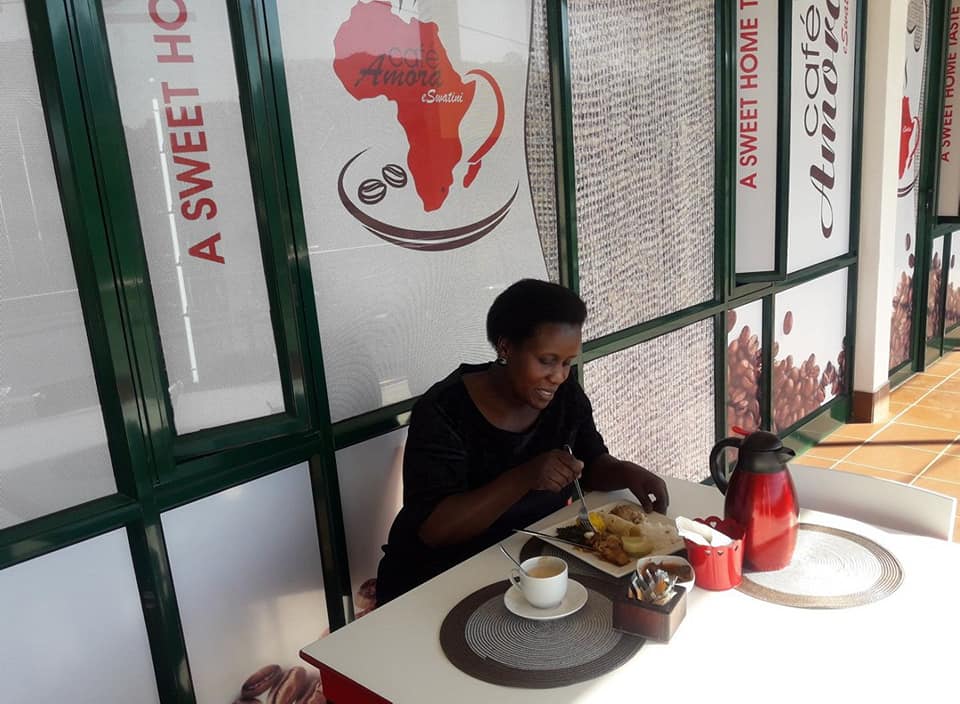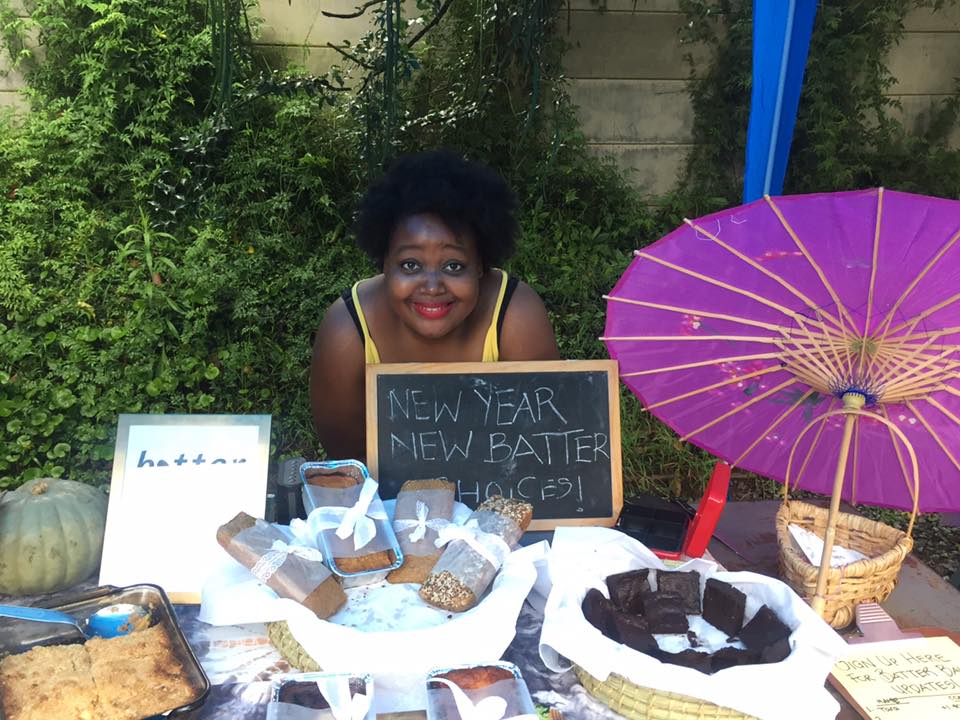Opening the door for oneself is not easy, but looking at how other women have succeeded in the business world will no doubt prove that with the right amount passion and a lot of hard work and dedication, anyone can start and run their own successful business. And to inspire you, I bring you the story of just one of the many female entrepreneurs that we have here in Eswatini.
Christina-Fifi Mikango, 34, is the director of Ocean Fresh Import & Export (Seafood Retail Supermarket), founder and director of Ocean Cuisine Restaurant (Riverstone Mall) and Fifi’s Hair Boutique.
Ocean Fresh in Manzini is a familiar name to us locals; we know it as the place to go when we need a seafood fix. Fifi shares that Ocean Cuisine, which was established in 2016, came about because people would ask how the different fish that they sell at Ocean Fresh tasted like. “They didn’t know how to even cook it.” So she’d say to them: “Hambani niye Ocean Cuisine niyodla khona.” And as a lover of good food, it was no doubt a natural business step to take.

Given that Eswatini is a country populated with meat-lovers, I’m eager to know what the demand for seafood is in the country. Fifi explains that the demand is quite “high” due to fish being recommended for its health benefits. “When we started we used to bring in 24, 000 kgs of fish a month, now it’s 48, 000 kgs. So twice the amount! We even moved from a small shopping space to a bigger one because of the demand.”
Humble Beginnings
Born in Dar es Salam, Tanzania, Fifi and her family relocated to Eswatini in 1994 and settled in Manzini. “We came in as refugees from Burundi,” she says, “as we were fleeing our war-torn home country.”
Fifi also did all her schooling here, “I went to Sidney Williams Primary, St Theresa’s and then finished off high school at Waterford.” After completing high school, Fifi studied towards a Diploma in Business Management. Whilst doing her studies she took a break and got a piece job.
During this time she started selling clothes. “I started trading because my parents were also in trade.” She started this side hustle around 2006, while working a full time job. “Friday I’d knock off early and go to Mozambique to buy a few items. Stay Saturday and come back on Sunday, and then Monday back to work.”
Her entrepreneurial spirit goes even further back as Fifi used to sell sweets to her classmates at primary school. Using some of her pocket/transport money she’d buy a couple of sweets, sell them and make a profit. Even if it meant walking home, she says the choice would rather be to use that money to push her sweet-selling enterprise.
Taking the Entrepreneurial Baton
Going into business was almost the obvious choice, Fifi says: “Both my parents were self-employed and it was through seeing their sheer hard work and determination that I envisaged myself having my own business. It was not going to be easy for me to find employment locally being a foreigner; so the only alternative was to go into business.”
In fact, all her family is in business — she is one of five sisters and two brothers.
Fifi launched herself into the business world by buying a takeaway restaurant at the bus rank, and followed this up with buying two more eateries. She also started a flower shop, training school for waiters, cleaning and pest control business. However she has since sold these businesses and now focuses on her three main businesses.
On what motivated her to expand into these areas, Fifi says: “I love challenges. So I see a niche where something is missing…and I cover it.”

Putting in the Hard Work
Fifi doesn’t deny the hard work that went into running those multiple businesses, and at one point she was getting only 3-4 hours of sleep a day. Her day would begin at around 4:30-5:00 am and sometimes would end as late as 2 or 3 am.
Again showing how much her parents influenced her entrepreneurial drive, she notes: “Both my parents were hard workers. Because they were traders, they hardly stayed in the country. They’d move from one country to the next just trying to make a living so they always had this working spirit.”
Additionally, Fifi’s desire to be financially independent also pushed her to work hard for the things she wanted. “I never really wanted to rely on a man,” she says.

The Challenges of Being a Black Female Entrepreneur
It’s no secret that being a female entrepreneur, especially a young black entrepreneur, comes with some additional and unique challenges such as being discriminated against on the basis of your gender, race and age. Not to mention the challenge of not being taken seriously by your peers, employees and sometimes even your clients.
Fifi relates one such incident: “I remember this one time I was at Ocean Fresh. My late husband was white, he was Greek. So this guy then comes in and says to me, ‘I need to see your boss.’ I ask him, ‘Can I take a message…what is it about?’ I was sitting at the reception with the rest of the ladies [that work with us]. He says, ‘No, I made an appointment with your boss. I need to see him.’ Again I say to him, ‘Tell me what it is about, and I will go up to and ask him.” This guy then says to me, ‘Ye wena blackie! Ngitsite mine kuwe ngifuna kubona umphatsi wakho.’ The ladies were shocked and they said to him: ‘Do you know that the woman that you’re talking to is your ticket up? So if you don’t talk to her nicely there is no way you can get what you want.’
She adds that people question how a person like her can be running such a big organisation. “People look down on you, especially if you’re a woman, and you’re young and black.”
This shows the unwarranted skepticism that many black female entrepreneurs still have to face on a daily basis.
Business Priorities
In order to succeed in the business world, Fifi emphasises the need to understand your business and to be present, even if you have hired people to run it on your behalf. She advises: “Every now and then just go in there — and surprise them — and ask what happened here, what happened there.”
“If you’re not in charge or on top of your business, the people you employ will not run it like the way you run it. You have to be there as much as you can; you have to be the face of your business. And the mistake we make is that we open up businesses and let people run it on our behalf. As long as they know at the end of the month batotfola umholo wabo, they will not treat it the way you want…come month-end, they just want their salary.”
She also highlights the need to be humble and to be a people’s person when going into a business that deals with people. “You don’t look down upon anyone, you don’t size them up according to what they wear, how they look…never do that. And that’s the mistake some people make.”
To illustrate this piece of advise, she recounts an incident: “There’s an old man that once walked in at Ocean Fresh wearing very torn clothes. And you’re thinking: ‘What is this man going to buy here?’ This is what the employees were saying. Instead of serving him everyone one was saying, ‘Lomkhulu utosimoshela sikhatsi nje lana.’ Next thing, that mkhulu bought the most expensive items on the shelf and he paid for them in cash. So that goes to show you don’t size a person up by what they look like.”
Being a Leader (Not a Boss)
Fifi shares that when it comes to managing people at work she takes the leadership approach.
“I like to be a leader. [This is because] I actually do the job with the people that I work with…that’s leadership. I don’t like being a boss. I am not a boss, I’m a leader. When you lead the people then they enjoy their work.”
Another difference concerns how bosses mostly delegate tasks without knowing the effort that goes into fulfilling them. She believes that if both those in management and their staffers work together then they can “make the dream work.”

“If you want to build an empire you have got to be a leader. You’ve got to lead the people to build an empire with you. And help them grow; if they have dreams help them. Be there for them and help them focus on their dreams if they have things they want to do. I never hold onto a person,” she says. “I’m not selfish; I also help other people achieve their dreams…they also want to have a brighter future.”
To attest to this, some that have worked for her doing piece jobs during school holidays have graduated and gone on to get good jobs — for example as bankers. She recently bumped into a former employee that went through her waiter training school and is now a waiter at Hilton Hotel. He thanked her for the training he received, adding that he was where he was today because of her.
Plans for the Future
Much to my surprise Fifi says: “Retire.”
Going forward, she says she has plans to slow down and focus more on family-orientated goals. After working hard most of her life, the thought of retiring, despite her young age, is not so far down the road. She says the plan has always been to semi-retire in her 30s, after building up some financial security for her family.
Moreover reducing her working hours will allow her to give other people a chance to showcase what they can do, and also to help them where she can.
Getting to the heart of the matter, she says: “I want to be there for my [future] kids. We grew up na gogo. Gogo raised us because my parents were busy travelling due to their businesses. I’m not gonna leave my kids to be raised by grannies and nannies. I want to raise my own kids.”

Last Words
Given all her accomplishments, it’s hard to believe that Fifi still lives in Eswatini as a refugee.
She remarks that when she tells people about her refugee status, they are usually quite surprised. Maybe because it’s hard to reconcile the stereotypical image of a refugee with the stylish, accomplished business woman that she is today.
Written by The Swazi Innerviewer




Lovely! Go Fifi! I’m inspired *****
Thanks Chishala for your comment😍
I have seen first hand how hard working, humble and generous Fifi is and yes you are a leader!
She is an inspiration, love her humble soul to everyone! Go Fifi we love you🤩🤩
The Woman is Inspiring, didn’t know such businesses are Youth owned.
Truly speaking Aunt 🥰